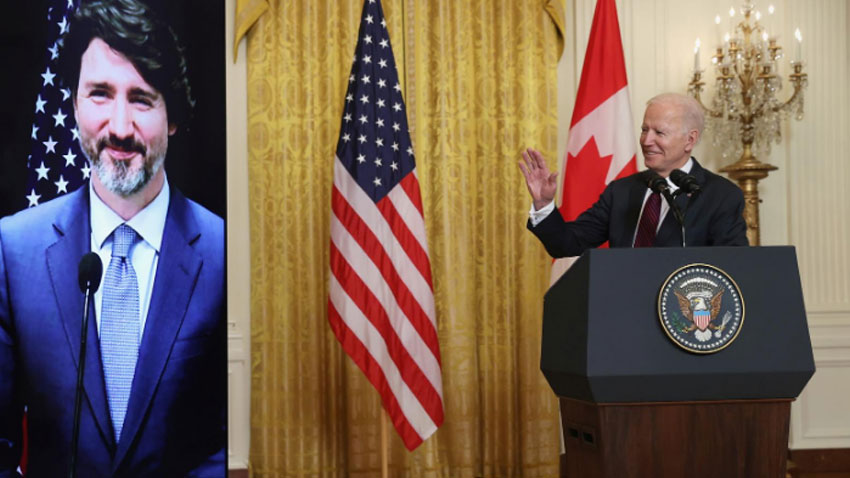Biden, Trudeau pledge to counter China, climate change, in warm first 'meeting'

WASHINGTON/OTTAWA (Reuters) - US President Joe Biden and Canadian Prime Minister Justin Trudeau sought to turn the page on the Trump era, stressing the countries’ deep ties and pledging to work together to counteract Chinese influence and address climate change.
After talking for about two hours, the two leaders emerged and said they planned to work closely together to beat the COVID-19 pandemic and combat climate change, with a goal of achieving net-zero emissions by 2050.
Trudeau also thanked Biden for reiterating U.S. support for the release of two Canadians held by China, Michael Spavor and Michael Kovrig. “Human beings are not bartering chips,” Biden said. “We’re going to work together until we get their safe return.”
Biden and Trudeau did not take questions after delivering their remarks.
Trudeau welcomed the Biden administration, citing in particular Washington’s renewed attention to climate change in contrast to former U.S. President Donald Trump.
Canada has often been a U.S. president’s first foreign stop, but the COVID-19 pandemic turned the sit-down between the two leaders and some of their top deputies into a virtual affair.
Biden, Vice President Kamala Harris and other officials, all wearing dark masks, sat at a long table in a White House meeting room, near a large video screen beaming in Trudeau’s image from Ottawa.
A Canadian government source said there had been no progress on the possibility of Canada accessing COVID-19 vaccines produced in the United States. Canada is currently receiving doses from plants in Europe.
“We’re focused on ourselves, the United States is focused on itself. They feel they have a supply shortage, so there is no news on that front,” said the source, who requested anonymity given the sensitivity of the situation.
REKINDLED ALLIANCE
Biden irritated Ottawa shortly after taking office on Jan. 20 by blocking the $8 billion Keystone XL pipeline project to pump oil sands crude from Alberta to Nebraska, and proposing a “Buy American” program aimed at directing more U.S. spending toward domestic manufacturers.
But the two leaders made clear they wanted to put the dispute behind them and work together.
The meeting drew scrutiny as an early view of Biden diplomacy. “Everyone around the world is watching this meeting very closely. They will want to get what the Canadians got and they won’t all succeed. This is the top level of access, the gold standard,” a senior Western diplomat in Ottawa said.
“”We feel we are off to the races here,” the Canadian government source added.
The Republican former president, who often clashed with traditional allies on trade, imposed tariffs on Canadian aluminum and steel. He traveled only once to Canada for a G7 meeting in 2018, and blasted Trudeau for being “very dishonest and weak” after he left.
Trump also forced the renegotiation of the North American Free Trade Agreement, talks that consumed Trudeau’s government for years.
Tuesday’s session began with a 45-minute meeting between Biden, Harris, Secretary of State Antony Blinken, national security adviser Jake Sullivan and their Canadian counterparts.
Another meeting with more officials followed. Trudeau was accompanied by his finance minister, Chrystia Freeland, and others.
The official said the White House had expected Trudeau to raise the issue of the two Canadians detained by Beijing and charged with espionage after Canada’s detention of Meng Wanzhou, chief financial officer of China’s Huawei Technologies Co Ltd, on a U.S. arrest warrant.
Meng remains under house arrest.
Biden also said the leaders would work closely to strengthen supply-chain security and resilience, and to drive a robust post-pandemic “economic recovery that benefits everyone, not just those at the top.”







